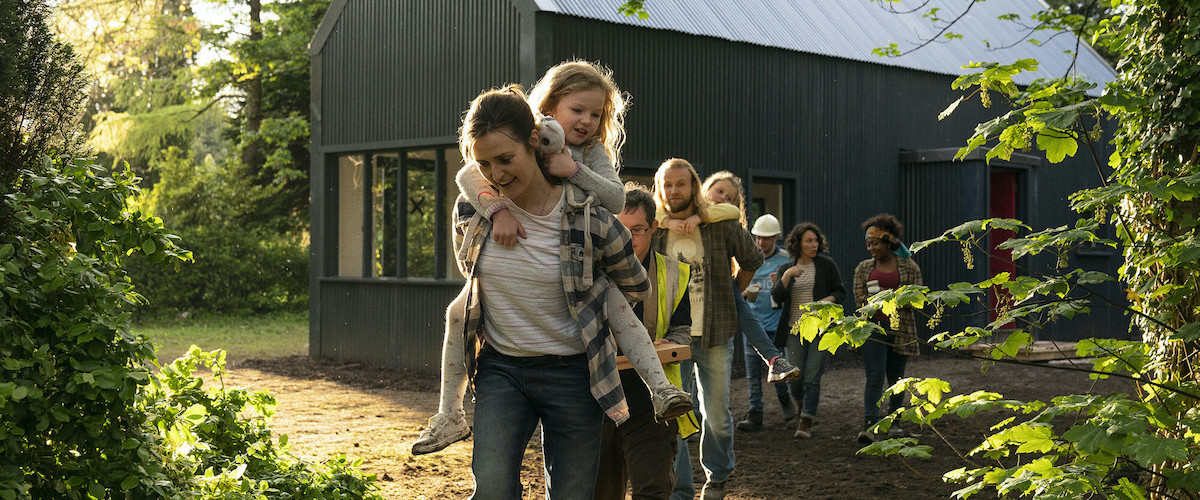
Film Review: Herself
Film Reviews
Herself
Director: Phyllida Lloyd
Element Pictures
In Theaters 12.30 and Amazon Prime 01.08
The new film Herself is a bold drama that deals with domestic violence and how victims find the strength to move on. It’s a subject that’s been dealt with in fiction, but rarely in the honest and compassionate manner that we see in Phyllida Lloyd’s new film. When done on television, it’s almost always supporting characters or guest stars—and in film, if the victim is the protagonist, it’s kept almost entirely to revenge thrillers, from Enough to last year’s The Invisible Man, which put jump scares and campy moments of violent retribution ahead of serious insights and character drama. Movies can be guilty of their own form of victim-shaming by training us not to root for those who suffer abuse fully unless they seek vengeance—as if it that notion had anything whatsoever to do with strength or courage.
In Herself, Sandra (Clare Dunne, Spider-Man: Far From Home) is a woman in Dublin who, along with her two young daughters, escapes from her abusive partner, Gary (Ian Lloyd Anderson, Game of Thrones)—only to find herself struggling to find a place to stay and getting little help from the housing authority. After months of struggling and working as a cleaning woman, Sandra draws inspiration from one of her daughter’s bedtime stories and starts upon the idea of self-building an affordable home.
She finds an architect who provides her with plans. Peggy (Harriet Walter, Sense and Sensibility, Star Wars: The Force Awakens), a client who knew Sandra’s mother, generously offers Sandra a patch of land. Sandra even finds a building contractor (Conleth Hill, Salmon Fishing in the Yemen, Game of Thrones), who appears to be willing to help, and begins to make serious headway. As her past rears its head in the form of her possessive ex, and as bureaucrats fight back against her independent spirit, Sandra is forced to rebuild her life from the ground up.
Director Lloyd (Mamma Mia!) approaches the script by Dunne and Malcolm Campbell (The White Queen, What Richard Did) with a forthright elegance, sympathy and an unleashed admiration for her lead character. Lloyd, Dunne and Walter have a history, having worked together on The Donmar Warehouse’s All-Female Shakespeare Trilogy, and that bond and shared sense of feminist determination shines through and makes the film rise so far above any of the pulpy thrillers that I mention previously that it quite literally puts them to shame.
Dunne is magnificent is the role of Sandra, imbuing the character with dignity and bravery—in no small part because she’s not perfect. The movie dares to deal with the fact that Sandra misses Gary and wishes that they could be what they once were. Sandra’s resolve to get out of this situation is made much more compelling and laudable by the fact that we’re given glimpses of what she saw in this man. We’re also given a shocking display of just how nasty he can be, and the repeated flashbacks when little things trigger Sandra’s panic attacks and PTSD are powerful and raw.
Walter is beautifully endearing as the woman who gives so much of herself to Sandra, and Hill is downright lovable as Aido, the contractor who works on the house. But no one can compete with Molly McCann and Ruby Rose O’Hara as Sandra’s girls. Anderson deserves a lot of credit for making the character of Gary so hard to utterly dismiss, even though he perhaps should be.
Herself is, at times, an unapologetic feel-good movie filled with hope, love and all of the things that make us cherish life, but it also knows how to make the audience feel the helpless and hopeless despair of those moments when it feels almost impossible to go on. It saddens me that Amazon isn’t being more aggressive in promoting this wonderful film, and for the life of me, I can’t understand why Dunne is barely even registering when it comes to talks as an awards contender, as an actor or as a writer. This is a revelatory moment as a major, new presence in cinema is unleashed, and one would think she’d be getting more hype.
Herself is a beautiful, sensitive and life-affirming movie that comes with my highest possible recommendation and a sense of unbridled enthusiasm for whatever Clare Dunne has planned for us next. –Patrick Gibbs



